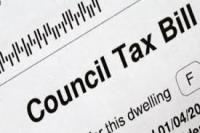Council Tax Arrears - Many Struggle to Meet this Cost
Thursday 12 March, 2020 Written by Simon Collyer
COUNCIL TAX - New research from Citizens Advice finds that many people in council tax arrears can’t afford to pay their debts and have an average of just £7 left at the end of the month after covering their living costs. Some four in 10 have no money left at all.
Council Tax is a priority debt and councils have extensive powers to enable them to collect it.
The overwhelming majority - nine in 10 of the people who seek help from Citizens Advice with council tax debt - also owe money on other household bills, most commonly water and energy costs.
Yet outdated government regulations are forcing these people into sometimes desperate hardship. They push councils to use the courts to recover council tax debts which can add legal costs and bailiff fees to the debt.
The charity says the rules also mean people become liable for the full annual bill two weeks after a missed payment. This means that missing an average council tax payment of £167 in the first month of the financial year can escalate to a debt of over £2,000 in just nine weeks. This is almost 300 times the monthly amount available to the average person seeking support from Citizens Advice on council tax arrears.
The system is also failing local councils. A 2019 Freedom of Information request revealed that, for every £1 of debt referred to bailiffs by councils, only 27p is ever returned to them.
Last year, the charity Citizens Advice helped more than 83,000 people in England with council tax problems, over 40% more than the next biggest debt issue.

Image: Will Quince MP, Minister for Welfare Delivery.
ABC Note: In a letter from MP Will Quince to the ABC it has been pointed out that LHA (Local Housing Allowance) rates were introduced in 2008 as a way of calculating Housing Benefit for tenants in the private rented sector and tenants are entitled to a flat rate of rent allowance regardless of the contractual rent paid. Rent is generally paid to the tenant though it can be directed to the landlord in cases of arrears. The Valuation Office in England and the Rent Services in Scotland have the job of keeping the LHA rates that apply with them under regular review. LHA rates are published by Local Authorities and by the Valuation Office Agency. On the Gov.uk website at https://lha-direct.voa.gov.uk/search.aspx tenants can compare how much support is available towards their housing costs in different areas and for different property sizes.
Mr Will Quince MP then says LHA rates are not intended to meet rents in all areas and there should be no presumption that Housing Benefit will always pick up the bill. The intention behind the welfare reform programme is that the same considerations and choices faced by people, not in receipt of benefit should also face those claiming benefit and the LHA policy is designed to achieve this.
The point is though, conventional tenants are not subject to the discrimination faced by those on Universal Credit, where far fewer properties are available in reality than to the average tenant looking for accommodation. Rents have skyrocketed...the UK has seen the biggest increase in rent hikes in Europe. In contrast, our state pensions are some of the worse in Europe and welfare benefits have been frozen for six years far reducing their purchasing power. Thus renters who want to pay their Council Tax are finding that they have no money left to pay them. They are then subject to the costs added by bailiffs and all the distress and anxiety that comes with this process. Tenants evicted soon rack up huge costs in legal fees, moving costs and emergency housing costs.
The cheapest option can often turn out to be the most expensive in the long term, many consumers know.
Government policy is not helping people to work it is making them homeless. At the ABC we say that if people have paid to insure themselves against ill health and losing their employment that they should be paid in full. The Valuation Office like any organisation in the fast-paced world we live in has fallen behind actual events. Their valuations do not reflect the real world. Thus, the living component of Universal Credit is subsidising the missing LHA rate [money] and now with other costs rising many people can no longer afford to pay Council Tax needing to buy food instead. With BREXIT and Coronavirus, this situation can only get worse.
ABC Comment, have your say below:

1 comment
Leave a comment
Make sure you enter all the required information, indicated by an asterisk (*). HTML code is not allowed.
Join
FREE
Here










